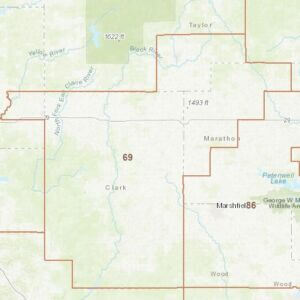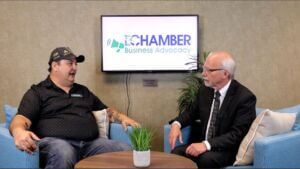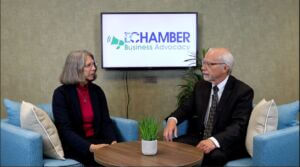Assembly District 69
Confirm your Assembly District (Wisconsin Legislature)
Register to vote, find your polling place, request an absentee ballot (MyVoteWI)
The Chamber's Election Page (Eau Claire Chamber of Commerce)
Candidates for Assembly District 69:
Roger Halls (Democrat)
Website
Social Media
Rep. Karen Hurd (Republican- Incumbent)
Website
Social Media
Good Government Council Questionnaire
The Good Government Council (GGC) is a committee of the Eau Claire Area Chamber of Commerce dedicated to encouraging voter participation and providing members of the business community with non-biased information about candidates’ positions on important issues. Although the Chamber is active in policy issues, it is non-partisan and does not endorse political candidates.
Candidate Responses:
1. Why are you running for this office, and what are the top three priorities you will emphasize if elected to the next session of the legislature?
Roger Halls
"I have always been taught that if you want to see change, you must get active and make change. I see many things that need change and unfortunately, the other party is hindering that change.
My top three priorities are:
1. Healthcare. This includes keeping politicians out of healthcare decisions. This includes making changes so that people, crops, and livestock all have clean non-toxic water and making healthcare more affordable.
2. Equality. This can be defined in many different ways, including equal rights, wage equality, religious equality, and many other definitions. All residents of Wisconsin deserve equal representation and economic opportunity.
3. The shift to rural broadband. Working in information technology, I see first-hand what internet access has to offer. I tend not to look at the bad, but the good. You have the sum of all human knowledge at your fingertips, you have access to education, and businesses have the entire world as a possible customer base."
Karen Hurd
"I am running for office to serve the people of Wisconsin. My desire is to represent Wisconsinites by addressing their concerns. My top three priorities are to lower taxes; ensure our government is fiscally responsible; and reduce unnecessary regulations that choke our business economy."
2. Businesses today face several significant workforce challenges, with more jobs open than individuals available to fill them. Among these issues are demographics related to the size of the workforce; state support to recruit and retain employees to the area; housing supply and affordability; and a crisis in childcare availability for working parents. What legislature’s role in addressing these issues?
Roger Halls
"As a legislature, we can do many things to address labor shortages. Some are the legislature can provide economic incentives for competitive wages and benefits to attract and retain workers, create quality-of-life initiatives like expanding health care, enhancing public transportation, improving public school funding and education, and making fair regulations that support businesses and protect consumers, workers, and the environment. We can pass laws encouraging affordable housing with zoning reforms and tax credits to developers, create first-time homebuyer programs, or initiate rent control measures. For childcare, the legislature can provide funding or incentives for childcare facilities to expand or improve their facilities or offer competitive wages to retain or attract professionals. We can provide childcare subsidies for working parents or encourage employer-sponsored childcare."
Karen Hurd
"The role of the legislature in addressing the workforce challenge is multi-faceted. This can be done by encouraging able-bodied persons without dependent children to work; increasing the availability of housing for the needed workforce through legislative measures (such as the Housing package of bills that the legislature passed and the governor signed into law this past session); assisting the childcare industry through legislation that will improve the availability of childcare (we introduced 10 bills this past session with that intent); continue to expand the number of tracks to the Youth Apprenticeship program, as well as continue to encourage retention of graduates from our schools to remain in Wisconsin through the use of scholarships that require a certain number of years to stay in Wisconsin to ply their skills."
3. With the sudden closures of hospitals and clinics in the region, and ongoing concerns about the future of rural healthcare, what is the role of state government in assuring access and affordability of healthcare for our area? What will you do to assure sufficient funding in the 2025-27 state budget to address these concerns?
Roger Halls
"Work to include dedicated funding for rural healthcare stabilization in the state budget. This would involve using the current reserve fund that can be deployed to prevent the closure of critical healthcare facilities in rural areas. I will push for expanding Medicaid to ensure more rural residents can access healthcare coverage. Additionally, I will advocate for increased reimbursement rates for rural healthcare providers to ensure they receive fair compensation for their services. Support significant investments in rural broadband to expand telehealth services, particularly in remote areas. This will include funding for telehealth equipment and training for healthcare providers to integrate telemedicine into their practices. Prioritize funding for loan forgiveness programs, rural residency initiatives, and other incentives to attract healthcare professionals to rural areas. This will ensure that rural communities have access to the skilled professionals they need."
Karen Hurd
"The intersection of private and public responsibilities in healthcare is complex. In this upcoming session, I will continue work with healthcare organizations as to the best way to solve our crisis."
4. There is a concerning increase in polarization and lack of civility in politics today. What will you do to improve the tone of public discourse, and are you willing to pledge to work on a bipartisan basis in our regional delegation to advance Chippewa Valley priorities?
Roger Halls
"I will prioritize active listening when interacting with colleagues, constituents, and stakeholders. Understanding different perspectives is key to reducing polarization and finding common ground. I will also encourage diverse thought and welcome input from all sides of an issue. This includes seeking out voices that may be underrepresented or marginalized. My pledge to prioritize the needs of the Chippewa Valley over partisan politics is a solemn one. I will actively engage with all members of our regional delegation, regardless of party affiliation, to advance initiatives that support economic growth, healthcare access, education, and other critical issues for our community."
Karen Hurd
"It has been and will continue to be one of my goals to be a statesman. Respectful discourse, without resorting to the use of ad hominems is the way that communication should be done. Name-calling and attacking the character, motive, or some other attribute of the person making an argument rather than the substance of the argument itself only precludes an atmosphere where collaboration can be accomplished. As far as working in a bipartisan manner, that has already been happening, and I will continue in that effort."
5. Why should a business person in the Chippewa Valley vote for you to represent them in the state legislature? What role should state government take in supporting a vibrant business economy in Wisconsin?
Roger Halls
"My goal is to ensure that the Chippewa Valley remains a competitive and attractive place to do business by concentrating on providing incentives for innovation and growth, focusing on public education to increase workforce development, improving infrastructure like rural broadband, supporting both urban and rural businesses, and working across the aisle. The state can invest in education from early development to university level and job training with apprenticeships. Create fair regulations that support business and keep consumers, workers, and the environment safe. Use infrastructure development as an economic driver, and provide support by offering grants, low-cost loans, access to mentorships, business planning, and marketing assistance. We can also work on fair wages and healthcare as a well-paid workforce spends money, and a healthy workforce is a productive workforce. Healthcare can also be a barrier to start-ups and growth, making it more affordable can relieve that."
Karen Hurd
"A vibrant business economy is at the foundation of a society that is successful, and prosperous. As our businesses flourish, employee wages increase. As employees have more money to spend to purchase products or services, then demand for products and services increase, thus increasing the growth of our businesses. It is a circle of success that needs to be promoted by enacting legislation that helps businesses to thrive. As a small business owner myself, I understand this necessity in making a strong economy."
The Chamber's Business Advocacy Initiative:
Advocacy Principles
2024 Business Issues Agenda
Fall 2024 Election Resources
Where you vote and what is on your ballot:
Go to myvote.wi.gov
To register to vote, find your polling place, or request an absentee ballot.
Posted by Johnny Meagher Governmental Affairs Intern
Meagher@eauclairechamber.org


